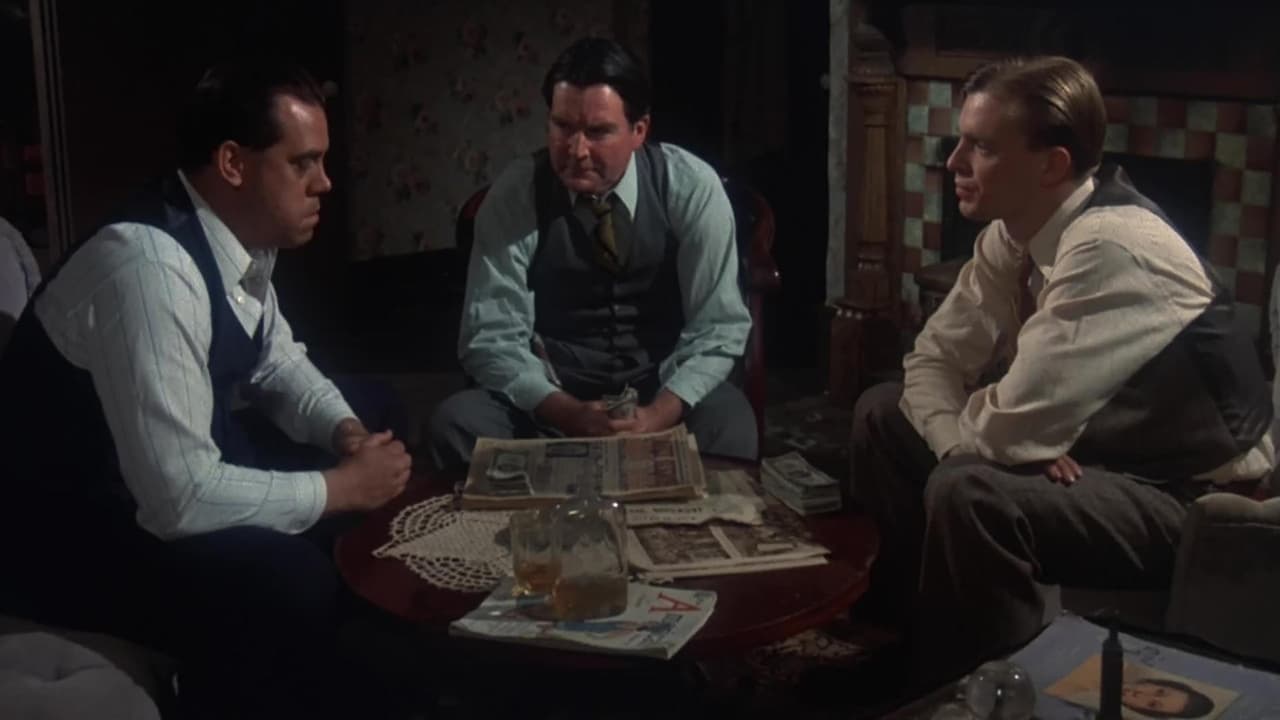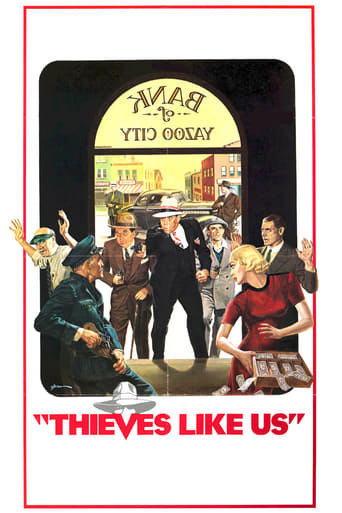

Don't listen to the Hype. It's awful
... View MoreThere's no way I can possibly love it entirely but I just think its ridiculously bad, but enjoyable at the same time.
... View MoreIt really made me laugh, but for some moments I was tearing up because I could relate so much.
... View MoreMostly, the movie is committed to the value of a good time.
... View MoreTwo convicts break out of prison in 1936 to join a third on a long spree of bank robbing. The youngest of the three (Keith Carradine) falls in love along the way with a girl (Shelley Duvall) met at their hideout, the older man is a happy professional criminal with a romance of his own, the third is a fast lover and hard drinker fond of his work.This is the second film that Keith Carradine and Shelley Duvall worked on together, the first being "McCabe and Mrs. Miller". They would work together again on "Nashville" and Duvall would appear in more Altman films than any other actor.The film was based on the novel "Thieves Like Us" by Edward Anderson, which was also the source material for the "They Live by Night" (1949). Whether Altman was familiar with the older film or not is unclear, as he expressed a liking for the novel and had Joan Tewkesbury write a script based off it. There is no indication the older film had an influence at all.In order to make this film, the studio required Altman to make a film about country music, which would become "Nashville". As some consider the latter his best work, they have Altman's dedication to this film to thank. Others may enjoy this more, as it is a bit more like his previous film, "The Long Goodbye", which is the other contender for Altman's best film.
... View MoreThieves Like Us (1974)I really like most Robert Altman Films, but I never quite love any of them, even famous films like "MASH" or "Short Cuts." And "Thieves Like Us," which is a kind of loose remake of a favorite of mine, "They Live by Night" (1949, Nicholas Ray), is another really enjoyable, well made movie that lacks some kind of edge--creative, aesthetic, social, something--to set it off as remarkable and fresh. You might get the most out of this by just settling in and enjoying it, a plot that purposely lacks some of the high romance of, say, "Bonnie and Clyde" or some other outlaw-on-the-run movie. But if you do see the earlier Ray version, which is based on the same novel, you'll at least notice the way movie production has changed from the great Hollywood years of the 1930s and 40s to the New Hollywood inventions of the late 60s, early 70s. This movie lacks the sheer beauty of the first, the perfection, made possible by studio shooting. Here, it is all location work (in Mississippi), which adds authenticity and atmosphere, but which also keeps it from the kind of tight control of a typical 40s film. Another difference might simply be that this is a Altman movie and the other is by the inimitable Ray, who was able to fill his characters with humanity and heart, and so even lesser known actors (all of them) come alive fully. Altman's characters have all the quirks and nuances of real people, and though it doesn't feel a bit like a documentary, you do have a feeling that none of this rises above. It is meant to be grounded in a kind of realism that gives it authenticity over heightened drama. It's a choice I appreciate, even if it sometimes deadens the film.The plot is important for how it makes bank robbers as ordinary as you or me (hence the title). The augment to this is that we are supposed to identify with them--or by a stretch, we could picture ourselves doing the same thing. But that's just not true. The robbers seem very regular and normal, but they also seems selfish and stupid. They plow ahead regardless of better options. And it's too often about money--money they never actually use (they live in squalor) or know how to dream about using (they have few dreams, in fact). The leading couple here does have a romance, and it's truly touching, but also tragic. Altman can't help but pull a "Bonnie and Clyde" ending, of sorts (slow motion violence) but it feels hard and nasty. Maybe it's supposed to, a reaction to police authority appropriate for 1974.So what do we really have? A substantial, well made, restrained movie that plays a little too much by the book--the new book, the New Hollywood book, but a little timid cinematically.
... View MoreWhen watching Thieves Like Us, one will almost certainly get the feeling of deja vu in thinking back to the classic 1967 American film Bonnie and Clyde. Indeed, Altman's film owes a bit of gratitude to that picture as its success opened up the door for films like this to be made throughout the early 1970s. While some may claim Altman simply copied the successful formula of Bonnie and Clyde in adapting Edward Anderson's novel, I think the deft touch of Altman's style is pervasively present.In nearly all of Altman's films, the characters and their quirky individual idiosyncrasies are far more important than plot and exposition. This is especially true here as we come to really know and understand who these trio of thieves and their compatriots are while all but predicting exactly what will happen next. Altman could care less what happens to them and neither do we. What is more important is how they react. The acting is very helpful in this department, particularly with the leads of Keith Carradine and Shelley Duvall as Bowie and Keechie, who fall in love yet cannot seem to simply escape from the world in which they are trapped in.The supporting cast is also very good, particularly Louise Fletcher and Burt Remsen, but Altman's direction really steals the show as the most memorable part. He hardly ever uses close-ups, daring to get us to connect with these characters as we watch them commit robberies and shoot up the south. He also continues his progression in the sound editing department, using the radio as a thematic link for the whole film. Like the overhead announcement horns in MASH, the various programs and people heard on the radio give a different emotional and visual impact to what is happening in the scene (For example, when Bowie and Keechie first come together intimately, Romeo and Juliet plays over the radio).The only criticism I have of this film is that it too closely parallels that of Bonnie and Clyde, a much better and more engaging and challenging film. The originality isn't in the story but the characters; Altman's characters can't be found in practically any other type of movie. They are unique to his style and substance and soon you realize that is how it should be for it wouldn't work under anyone else.
... View MoreThe novel by Anderson must not be very interesting because two noted directors have made average movies out of it: Nicholas Ray's "They Live by Night" in 1948 and this Altman version. At least Ray had the advantage of brevity; Altman's film moves very slowly and outstays its welcome. Carradine and Duvall don't click as well as Farley Granger and Cathy O'Donnell did in the earlier version. However, the supporting performances are better in the later film, including Fletcher in her film debut. This use of the radio as a commentary on the action is overdone, particularly in the scene where "Romeo and Juliet" plays on the radio while Carradine and Duvall are making out.
... View More